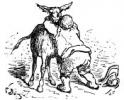Foofaraw
Sound, fury and flapdoodle
Dear Word Detective: “Hooferah” — am I spelling this correctly? This is something my father says a lot, but he doesn’t know how to spell it, either. When something’s too fancy, he says, “too much highfalutin’ hooferah.” Can you please explain? — R. Perreault.
I’ll give it a shot. Incidentally, this is one of “those questions.” Every so often I spend hours searching for a word that someone has heard a relative use, only to find no evidence that anyone other than that relative has ever used the word. So I never know, when I answer one of these “my dad uses a weird word” questions, whether I’m going to unearth a treasure or end up having to explain that Pops is speaking his own special language, nudge nudge, wink wink.
In the case of “hooferah,” however, we have a winner. What your father is using is pretty clearly a variant of “fooferah,” also spelled “foofaraw,” “fufurraw,” “froofraw,” and about a dozen other ways. At some point in the past the initial “f” in “fooferah” was replaced with an “h,” probably when someone was putting together the phrase “highfalutin’ hooferah,” which is nicely alliterative.

The Old West
For the sake of convenience and my own sanity, from now on I’m going to use the spelling used by the Oxford English Dictionary (OED), “foofaraw.” The OED defines the noun form of “foofaraw,” which first appeared in print (as far as we know) in 1848, to mean “trinkets or gaudy apparel,” with the extended meaning of “frivolous trappings or accoutrements.” In the 1930s, “foofaraw” took on the added meaning of “commotion or brouhaha.” But the most common meaning in use still seems to be “an excessive and ostentatious display; unnecessary or pretentious frills” (“The same car but without such niceties as polished wooden picnic tables in the back seat and similar foofaraw,” NY Times, 1995). As an adjective, “foofaraw” means “fussy, vain, stuck-up.”
“Foofaraw” is an authentic relic of the Old West in 19th century America, a time and place where it was not uncommon to encounter speakers of something other than English. Thus it appears that English-speaking hunters and trappers picked up “foofaraw” from the Spanish “fanfarrón” (meaning “braggart, showoff”) and possibly also the French form of the same word, “fanfaron.” It appears that the English “foofaraw” was also influenced by the French “frou frou,” originally an “echoic” (or “onomatopoeic”) word for the rustling of petticoats, later adapted to mean “frills and fancy ornamentation.” “Foofaraw,” interestingly, is closely related to another “echoic” word, “fanfare,” which was formed in imitation of the sound of a flourish of trumpets. It is possible, in fact, that “foofaraw” is also an onomatopoeic invention, similarly intended to convey by its sound the empty spectacle of meaningless flamboyance and pretension.
Page 1 of 2 | Next page
